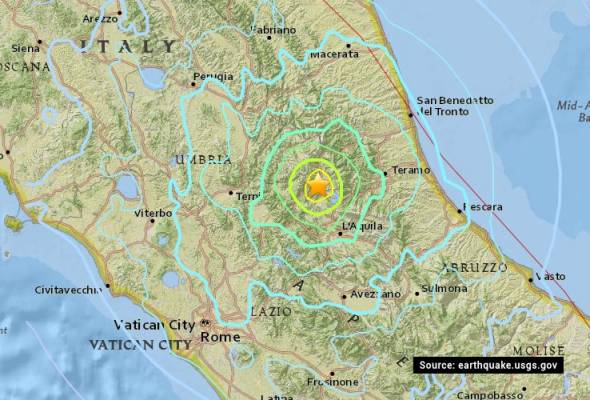INTERNATIONAL
Series of strong earthquakes hit central Italy


A series of strong earthquakes hit central Italy on Wednesday, including the capital Rome, forcing schools to be evacuated and rail links to close. -USGS
A series of strong earthquakes hit central Italy on Wednesday, including the capital Rome, forcing schools to be evacuated and rail links to close, although there were no immediate reports of serious damage or injury.
The multiple tremors, including three above magnitude five, were clustered around a region which was battered by a spate of deadly quakes last year.
Buildings in Rome wobbled and the city's underground metro system was shut as a precaution. Schools across the capital were also closed.
Residents nearer the epicentre, which has been swept by snow storms and is some 100 km (62 miles) northeast of Rome, rushed out into the streets as the series of tremors rattled the area.
"Everyone is outside. It's very cold and windy," said Lina Mercantini of the village of Ceselli in the Umbrian region about 80 km (50 miles) from the epicentre.
"This is totally unnerving. It's never ending. We are all shaking."
The US Geological Survey said the three strongest earthquakes had a magnitude of 5.3, 5.7 and 5.3. They all struck within the space of about an hour.
Each was at a depth of about 10 km (6.2 miles) and were roughly 7 km (4.3 miles) from the town of Amatrice, which was flattened by a powerful tremor last August.
"The biggest problem now is the snow because we are having trouble getting around and assessing any damage," said Luca Cari, spokesman for the national fire brigades.
The Aug. 24 quake killed 300 people and destroyed thousands of homes and businesses. More than 45,000 aftershocks have since rattled the region, including a 6.6 magnitude quake in October, the biggest tremor to strike Italy for 36 years.
The bell tower of Amatrice, which had been badly damaged last year, finally collapsed on Wednesday, local media said.
The recent quakes have reshaped more than 600 square km (230 square miles) of land, lowering areas around the epicentre by up to 70 cm (28 inches), according to data released by Italy's National Institute for Geophysics and Volcanology (INGV).
The multiple tremors, including three above magnitude five, were clustered around a region which was battered by a spate of deadly quakes last year.
Buildings in Rome wobbled and the city's underground metro system was shut as a precaution. Schools across the capital were also closed.
Residents nearer the epicentre, which has been swept by snow storms and is some 100 km (62 miles) northeast of Rome, rushed out into the streets as the series of tremors rattled the area.
"Everyone is outside. It's very cold and windy," said Lina Mercantini of the village of Ceselli in the Umbrian region about 80 km (50 miles) from the epicentre.
"This is totally unnerving. It's never ending. We are all shaking."
The US Geological Survey said the three strongest earthquakes had a magnitude of 5.3, 5.7 and 5.3. They all struck within the space of about an hour.
Each was at a depth of about 10 km (6.2 miles) and were roughly 7 km (4.3 miles) from the town of Amatrice, which was flattened by a powerful tremor last August.
"The biggest problem now is the snow because we are having trouble getting around and assessing any damage," said Luca Cari, spokesman for the national fire brigades.
The Aug. 24 quake killed 300 people and destroyed thousands of homes and businesses. More than 45,000 aftershocks have since rattled the region, including a 6.6 magnitude quake in October, the biggest tremor to strike Italy for 36 years.
The bell tower of Amatrice, which had been badly damaged last year, finally collapsed on Wednesday, local media said.
The recent quakes have reshaped more than 600 square km (230 square miles) of land, lowering areas around the epicentre by up to 70 cm (28 inches), according to data released by Italy's National Institute for Geophysics and Volcanology (INGV).
